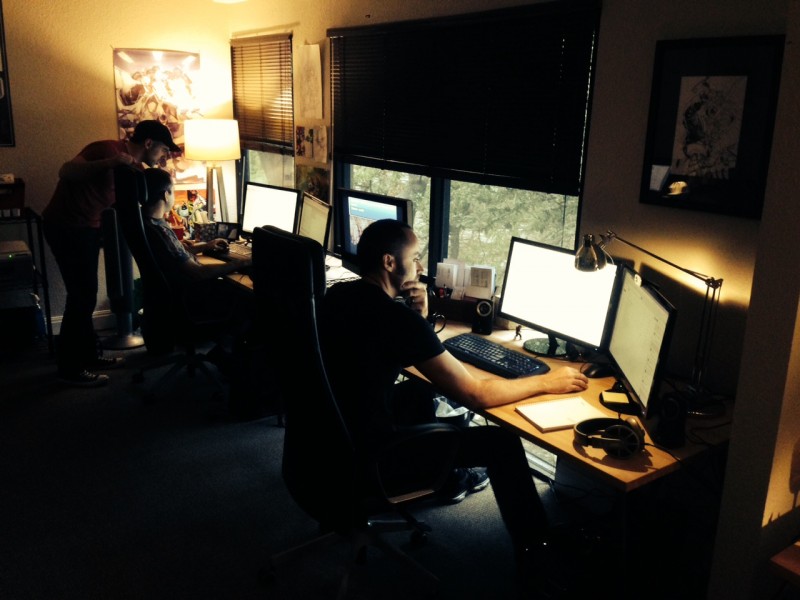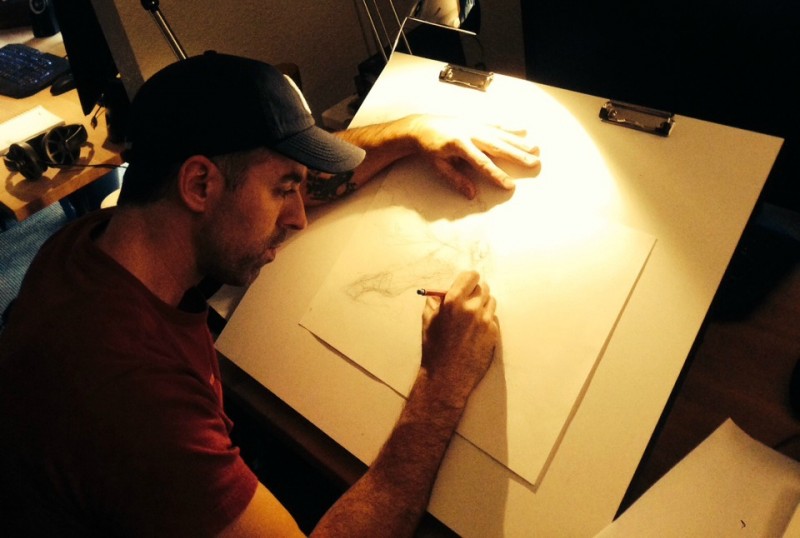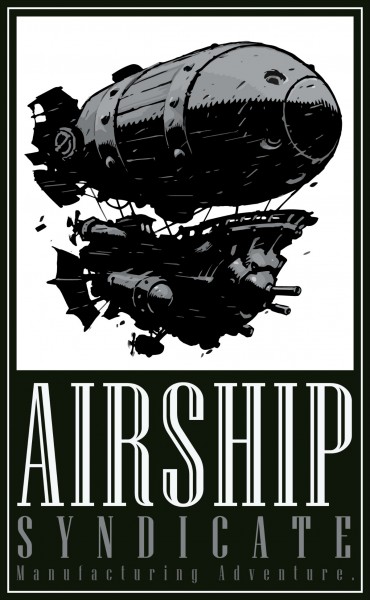007 First Light headlines our newest issue about the most anticipated games of 2026 and beyond. Subscribe now!
Former Darksiders Developers Form Airship Syndicate

Vigil Games, the studio behind the Darksiders series, closed its doors on January 23, 2013 – one of several development houses affected by THQ filing for chapter 11 bankruptcy.
At the time of the closing, Vigil Games was working a new game codenamed Crawler. “When the teams got together recently to show each other their titles, Crawler dropped the most jaws,” THQ’s former president Jason Rubin told us a day after Vigil ceased to exist.
THQ auctioned off all of its assets and studios, but Vigil and Crawler were not purchased. The Darksiders property was sold to Nordic Games, a studio that hopes to keep the series alive under the THQ publishing name.
Many of the people who departed Vigil went on to other jobs in the video game industry, and a fair number of them didn’t have to travel far, as other Austin-based studios like Crytek, Retro Studios, and Certain Affinity were hiring.
Earlier this year, a handful of ex-Vigil employees, including one of the studio’s founders, David Adams, left Crytek to form Gunfire Games.
Today we learned that other Vigil Games founders are setting out on their own. Joe Madureira, Ryan Stefanelli, and other former Vigil developers are forming Airship Syndicate, an independent game studio that is already hard at work on a prototype.
I spoke with Madureira and Stefanelli about their time away from Vigil and their hopes for Airship Syndicate. They wouldn’t talk about the game they are working on outright, but they do drop a few tidbits that point toward what type of game they are making.
What have you two been up to since the closing of Vigil Games?
Ryan Stefanelli: Speaking for myself, I was with a lot of the other Vigil guys at Crytek USA working on Hunt: Horrors of the Gilded Age as a designer. As soon as that went down, I left Crytek a month or so before things came to a close there. Joe and I had been talking about doing something for a little while, actually. Once we realized Crytek wasn’t going to work, it just seemed like the right time for me to take the leap and do this.
Joe Madureira: For me, after Vigil I went back to comic books. I had a contract with Marvel to finish up a bunch of books. I did three issues of Inhuman. We both had the idea to start a studio together for a while, but we were both tied up in different projects and couldn’t make it work. We both finished our projects at the same time, and said, “It’s now or never.”
Stefanelli: Yeah, it’s something that we discussed informally for a while. We always had a cool idea for a type of game that we wanted to make. In particular, we wanted to work at a smaller studio. Vigil got very big. That grew from the four of us who started it to over 200 people, and was multi-project. Even Darksiders by itself, the team was big. By Darksiders 2 there were over 100 of us working on it. We always sort of felt that the golden era of Vigil was when it was smaller. We all kind of pined for that time, and wanted to get back to making games that could be built with a studio that was closer to that size…maybe even smaller. Of course that means building a very different kind of game than we were building at Vigil. And I think when the moon started aligning for us, where it seemed like we were both going to be free to work on something, we started discussing what that might be more seriously. That led us to where we are now.
How big is that ideal team for you guys?
Stefanelli: I don’t know. It’s hard to say. I love being on teams that are under 20 people. I think we’ve always said that 30 is when you stop getting to know everybody that is on the team.
Madureira: It’s cool to be in one room. Where you start to have meetings and managers, that’s too big. It’s nice knowing what everyone else is working on, and being able to peek at someone else’s desk and have them show you something. It’s nice to feel like you are hanging out in a room with your friends. It almost doesn’t feel like work. That’s how it was when we started Vigil, and then it grew into something crazy. We want to take it back to the roots. Much like the games we played growing up in the 8-bit and 16-bit eras. You know, they had small teams, just a couple of people making them. And there are a lot of games that probably wouldn’t be super-attractive to big publishers now, like RPGs and metroidvania games. Those real "gamer" games are like ones that we were like, “Maybe now there are other ways to get these games out there.” You don’t have to go the traditional route through a publisher. Maybe we can actually make some of these games with a small studio.

A lot of studios start with a particular aesthetic for the kinds of games they hope their studio is known for. Do you have a vision in mind?
Madureira: I think that adventure is a big thing for us. That’s why we sort of settled on the Airship Syndicate, as far as getting that vibe of exploration and otherworldly technologies. Games like RPGs and adventure games will sort of be at the heart of pretty much everything we do.
Stefanelli: At Vigil we always made games that were love letters to our favorite genres. I think that’ll carry through to Airship. We’ve always wanted to evoke that feeling of adventure and wonder. I think the difference here is that the game experience might be more intimate, I guess a bit more indie. That’s what’s kind of cool about the recent game movement, you see a lot of awesome RPGs, metroidvania games, isometric action games, the types of things we grew up loving, but as fresh and modern experiences. That’s probably a good way to describe what we’d like to do: classic experiences with a modern edge.
Madureira: I think, too, we’ll always have a strong character focus and story focus. We like developing worlds and IPs. That’s our bread and butter.
Stefanelli: Obviously, with Joe onboard, that’s going to be our studio’s strength. It’s going to be characters and story development and world development. We want to make games that can revolve around that.
Game developers have numerous publishing options available to them these days, from self-publishing to working with larger, established studios. What avenue are you currently looking at?
Stefanelli: At this point, we are pretty open to whatever is going to get the game made. It’s interesting: When we were at Vigil, literally the business plan was “put together a demo and pitch it to publishers and they say yes or no.” Now it’s a lot different because you can try and do it yourself or just go straight to Kickstarter. You can try to get outside investment. You can go to publishers either as doing an old, traditional publishing deal, or an investment from them. It’s really an interesting time to be putting a studio together. There are so many different ways you can go about paying for your game. The key for us is, whatever we do, and however we do it – whether it’s through Kickstarter or through investment and publisher – it’s to try and maintain control of the game. However we go about paying for it, that’s the goal – for us to keep control over the intellectual property and own the creative side of it as much as we possibly can.
Madureira: The fewer people we have to be beholden to and who can have sway over the direction of the company or the vision of the game the better. We would like to keep that to a minimum. We’re definitely going to make a strong effort to stay independent and raise the money on our own.
Stefanelli: But that said, even having discussed the idea we have for our first project with some of the bigger publishers, they are changing their perception of how they work with developers. They are willing to let studios keep their independence, and they are willing to do deals that are much different than they were back when we did Vigil. Even some of the big guys who you might assume are only going to do things in one way are starting to be more flexible in how they pay for projects, where they get creative control, and starting to trust talent – especially if the talent is proven in some way. They are starting to trust that talent more and more. It’s kind of exciting. I really think we have a lot of options for how we can get our first project done.

What systems are you looking to create games for?
Stefanelli: The game will start on PC since it’s the dev platform for the game and a natural home for indie stuff. We have our roots in consoles and would love to reach them, especially considering the game we have planned would be perfectly at home on a TV. So we’re designing around both of those.
Madureira: Tablets are cool, too. They’re getting more and more powerful, and becoming a fun way to play some pretty serious games, so they’re in the picture. The game will work well on a touchscreen with only minor changes. I’m not sure phones will make the cut though; they’re a little too small and casual for what we’re thinking.
How many people are from the Darksiders 2 team?
Madureira: We have a small group who were all key members of the Darksiders team, and a few more waiting for some pieces to fall into place before they join.
If given the chance, would you make another Darksiders game?
Madureira: We’ve talked about being involved in Darksiders, and have had some conversations with Nordic, but it’s not currently the plan. I will say the game we’re working on now isn’t Darksiders.
Stefanelli: We love it, though. I don’t think we’d ever dismiss it entirely.
When are you hoping to announce the game? And do you have an idea of when you hope to release it?
Stefanelli: I’m not exactly sure how or when we’ll announce. That’ll depend on a lot of things, chief among them how we fund the project and who’s involved in that decision. It’ll be a little while, I’m sure.
Madureira: I hope we can announce soon, because the excitement is killing me. And I'm terrible at keeping secrets!
For more on Airship Syndicate, check out their website, Twitter, Facebook, and Google outlets.


Get the Game Informer Print Edition!
Explore your favorite games in premium print format, delivered to your door.
- 10 issues per year
- Only $4.80 per issue
- Full digital magazine archive access
- Since 1991









